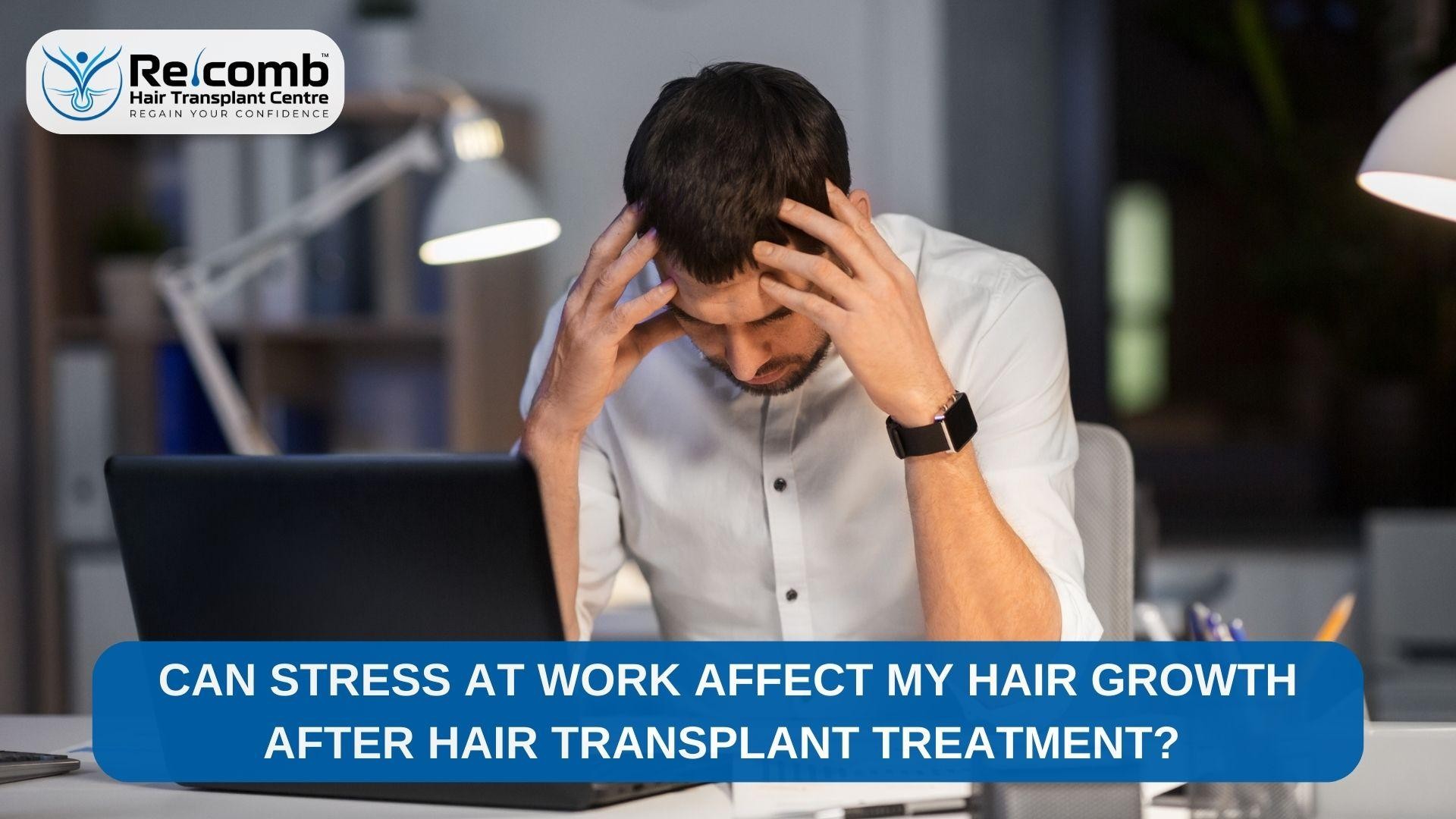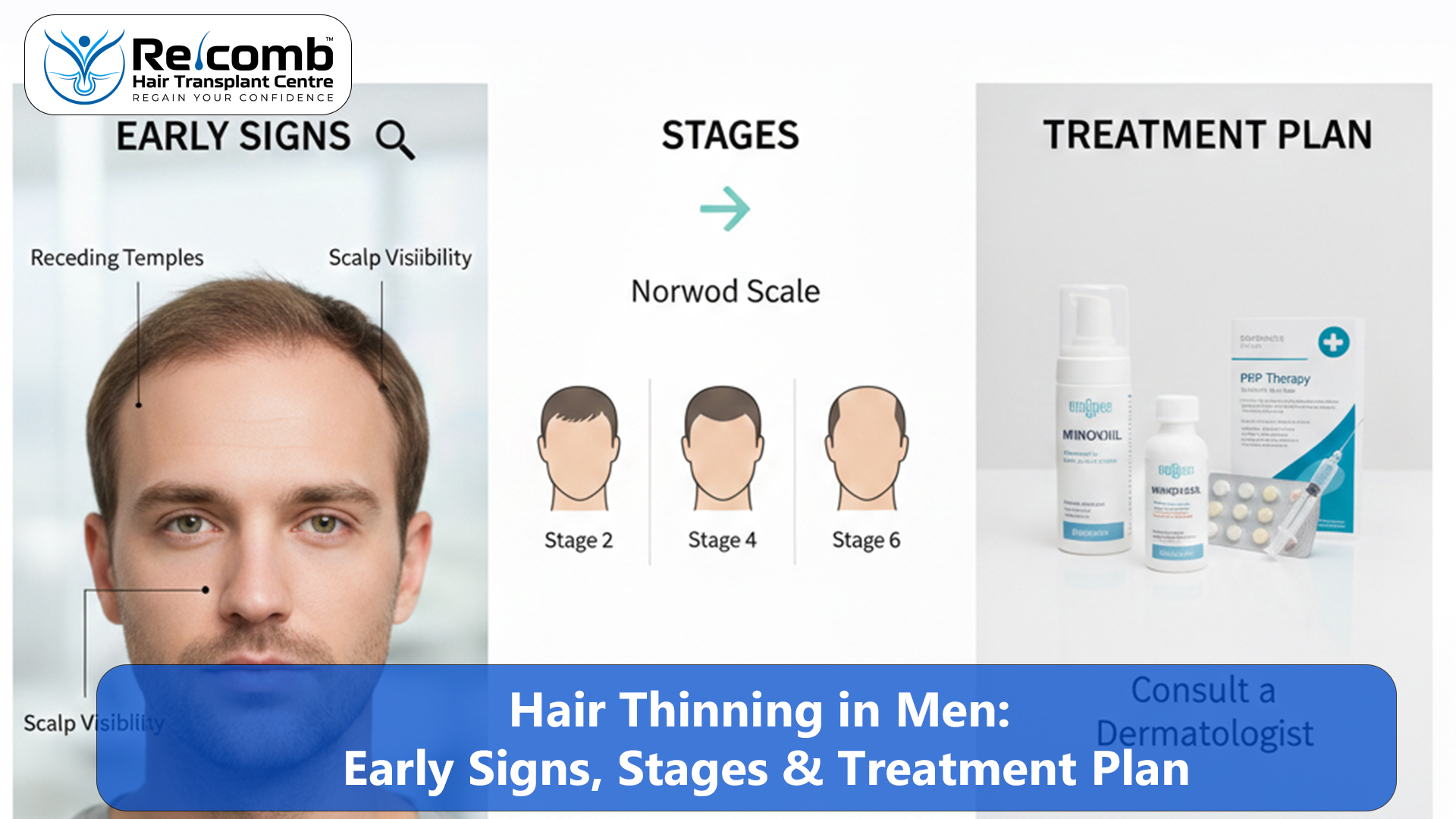
Undergoing a hair transplant is life-changing, offering new confidence and a fresh start for those battling hair loss. However, achieving the best results doesn’t end with the procedure itself, explain the best hair transplant doctors in Surat at Recomb Hair Transplant Centre. Many factors influence the success of your hair growth post-transplant, and one often-overlooked factor is stress — particularly stress from work. So if you are wondering if workplace stress actually affects your hair growth after a hair transplant? The answer is yes, and here’s why it matters.
How Stress Impacts Hair Growth
Stress is more than just an emotional response; it can have real, physical effects on your body. When you’re under stress, your body releases hormones like cortisol and adrenaline. Elevated cortisol levels can disrupt various bodily functions, including hair growth.
One of the most common conditions linked to stress is telogen effluvium. This condition causes hair follicles to enter a resting phase prematurely, leading to increased hair shedding. While this type of hair loss is usually temporary, it can significantly affect the outcome of your hair transplant if it occurs during the recovery period.
The Connection Between Work Stress and Hair Transplant Recovery
Recovering from a hair transplant requires your body to focus on healing and regenerating hair follicles. Experts from Recomb Hair Transplant Center, one of the best hair transplant centres in Surat, say that chronic stress — especially from a high-pressure work environment — can interfere with this healing process in several ways:
- Delayed Healing: Stress impairs your immune system, which can slow down the healing of the scalp after a transplant.
- Increased Inflammation: Elevated stress levels can trigger inflammation in the body, potentially affecting the transplanted follicles.
- Hormonal Imbalance: Stress disrupts hormone levels, which can negatively impact hair growth cycles.
- Poor Sleep Quality: Stress often leads to insomnia or poor sleep, which can hinder your body’s ability to repair itself.
Signs That Work Stress Is Affecting Your Hair Growth
If you’ve recently had a hair transplant and suspect that work stress might be interfering with your results, look out for these signs:
? Increased Shedding: Noticeable hair loss weeks or months after the procedure.
? Slow Hair Growth: Hair may appear thin or grow back slower than expected.
? Scalp Irritation: Itching, redness, or inflammation could signal stress-related complications.
? Fatigue and Burnout: Feeling constantly drained can indicate that stress is affecting your overall health and, consequently, your recovery.
How to Manage Work Stress After a Hair Transplant
Minimizing stress is essential for supporting healthy hair growth after a transplant. Here are several strategies to help you manage work-related stress:
- Set Boundaries: Establish clear boundaries to separate your work life from personal time. This could mean avoiding emails after hours or setting realistic deadlines.
- Practice Relaxation Techniques: Mindfulness, meditation, deep breathing exercises, or yoga can help reduce stress levels and promote relaxation.
- Get Regular Exercise: Physical activity is a proven stress reliever and can also boost circulation, supporting hair follicle health.
- Maintain a Healthy Diet: Eating nutrient-rich foods supports overall health and improves your body’s ability to recover and regrow hair.
- Seek Professional Help: If work stress feels overwhelming, don’t hesitate to consult a therapist or counselor.
Healthy Lifestyle Habits That Support Hair Growth
Besides managing stress, incorporating healthy habits into your daily routine as suggested by hair transplant surgeons in Surat can help optimize hair growth after your transplant:
? Stay Hydrated: Proper hydration supports cell function and scalp health.
? Prioritize Sleep: Aim for 7–9 hours of quality sleep per night to allow your body to repair itself.
? Avoid Smoking and Alcohol: Both can negatively affect blood flow and hinder the healing process.
? Follow Post-Procedure Instructions: Adhering to your surgeon’s aftercare guidelines ensures the best possible outcome.
When to Speak to Your Doctor
If you notice signs of slowed growth or increased shedding after your hair transplant, it’s essential to consult your doctor. They can help determine if stress or another underlying issue is affecting your recovery. In some cases, additional treatments like PRP (platelet-rich plasma) therapy or medications may be recommended to support new hair growth.
The Bottom Line
While a hair transplant can give you a fresh start, your body’s ability to heal and grow healthy hair depends on several factors — work-related stress being a significant one. Chronic stress can slow healing, disrupt hair growth cycles, and compromise the results of your transplant.
Taking steps to manage stress, practicing healthy habits, and following your doctor’s advice can make a significant difference in your recovery journey. By prioritizing your well-being, you’ll give yourself the best chance to enjoy the full benefits of your hair transplant and achieve the results you desire






